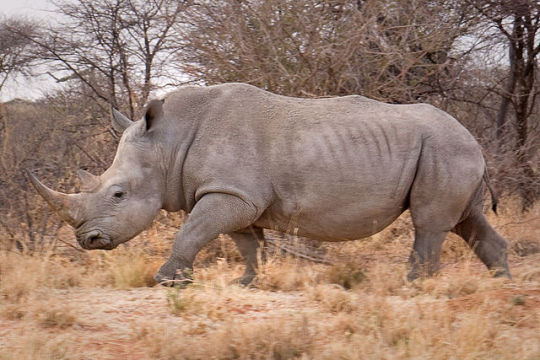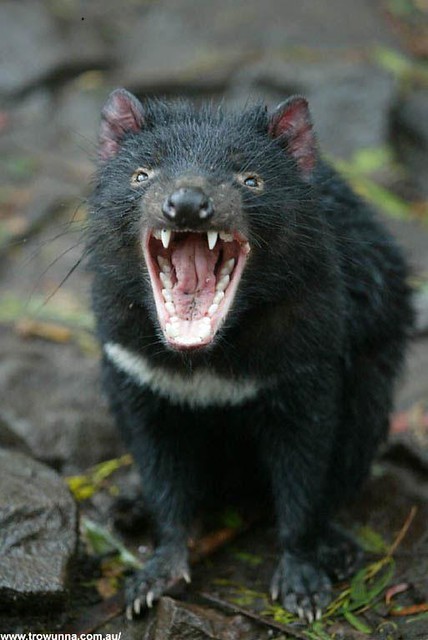Don't wanna be here? Send us removal request.
Text
Pufferfish

Tetraodontidae
From Greek tetra (four) + odont (”tooth”) + Latin idae (indicating “descent from”, used as a suffix for taxonomic families). Tetraodontidae is the family containing the pufferfish. The family is named for their four large teeth used for crushing crustaceans and molluscs.
5 notes
·
View notes
Text
Breast tooth

Mastodon
From Greek mastos (”breast”) + odont (”tooth”).
Named for the rounded protrusions on top of its molars. I’ll let you make up your own mind.

image credit: top: Charles R. Knight [Public domain]
bottom: Robert Chambers (1802-1871) [Public domain]
6 notes
·
View notes
Text
Lion-panther

Leopard
From Greek leon (”lion”) + pardos (”male panther”), derived from the belief that the leopard was a hybrid of the two.
image credit: Patrick Giraud (edited to fix white balance) [CC BY-SA 3.0 (http://creativecommons.org/licenses/by-sa/3.0/)]
2 notes
·
View notes
Text
Wolf fart

Lycoperdon
From Greek lýkos (”wolf”) + pérdomai (“to break wind”).
Lycoperdon is a genus of puffball mushroom, known as “wolf farts” in Spanish (pedos de lobo) and French (vesse-de-loup).
image credit: CC BY-SA 3.0, https://commons.wikimedia.org/w/index.php?curid=167116
7 notes
·
View notes
Text
Explosion-born lizard

Ekrixinatosaurus
From Greek ekrixi (”explosion”) + Latin nātus (”born”) + Greek sauros (”lizard”).
The genus was discovered due to blasting during construction of a gas pipeline in Argentina.
image credit: Ilya0068 [CC BY-SA 4.0 (https://creativecommons.org/licenses/by-sa/4.0)]
5 notes
·
View notes
Text
Gonad City

Csiromedusa medeopolis
From Greek mede (”genitals, gonads”) + polis (”city”). So named because the gonads of each sex are arranged around the top of the animal, resembling "skyscrapers in a downtown business district.”
The genus name comes from CSIRO, the Commonwealth Scientific and Industrial Research Organisation, + medusa (“jellyfish”).
image credit: ABC News
3 notes
·
View notes
Text
Knucklehead

Colepiocephale
From Latin colepium (”knuckle, unidentified preparation of meat”) + Greek kephalē (”head”).
Coliocephale is a genus of pachycephalosaurid (thick head lizard) dinosaur.
image credit: Danny Cicchetti [CC BY-SA 3.0 (https://creativecommons.org/licenses/by-sa/3.0)]
2 notes
·
View notes
Text
Legless bird-of-paradise

Above: a bird with no legs that never lands on Earth
Paradisaea apoda - greater bird-of-paradise
From a- (”not”) + Greek pous, pod- (”foot”)
The original study specimens were prepared by local New Guineans with the wings and legs removed, leading to the myth that the birds, as visitors from paradise, never landed on Earth.
image credit: By Andrea Lawardi - originally posted to Flickr as paradiso, CC BY 2.0, https://commons.wikimedia.org/w/index.php?curid=4558086
13 notes
·
View notes
Text
Camel bird

Struthio camelus - common ostrich
From Greek strouthós (“bird”) and kámēlos (“camel”), via Latin struthiocamelus (”ostrich”).
Romans also knew the ostrich as passer marinus (”sea bird”), because they were imported by sea.
image credit: MathKnight [CC BY-SA 4.0 (https://creativecommons.org/licenses/by-sa/4.0)]
4 notes
·
View notes
Text
Worm tongue

Vermilingua
From Latin vermis (”worm”) + lingua (”tongue”).
Vermilingua is the suborder of mammals that contains the anteaters.
image credit: Ellen from Ann Arbor, MI, USA [CC BY 2.0 (https://creativecommons.org/licenses/by/2.0)]
66 notes
·
View notes
Text
Deadly knife-tooth

Smilodon fatalis - sabre-toothed tiger
From Greek smilē (”knife”) + odont (”tooth”) and Latin fatalis (”deadly”).
image credit: Charles R. Knight [Public domain]
18 notes
·
View notes
Text
Flat-nosed horn-beast

Ceratotherium simum - white rhinoceros
From Greek keras (”horn”) + thērion (”beast”) and simos (”flat-nosed”).
Rhinoceros
From Greek rhis (”nose”) + keras (”horn”).
image credit: Ikiwaner [GFDL 1.2 (http://www.gnu.org/licenses/old-licenses/fdl-1.2.html)]
21 notes
·
View notes
Text
Corpse whale

Narwhal
Probably from Old Norse na ("corpse") + hvalr ("whale"), referring to its grey colour.
Monodon monoceros
The binomial name of the narwhal is Latin for one tooth (mono + don) one horn (mono + ceros)
24 notes
·
View notes
Text
Sacred bird

Threskiornis
From Greek thrēskeia (”religion, worship) + ornis (”bird”). The genus Threskiornis includes the African sacred ibis, worshipped by ancient Egyptians.
image credit: Derek Keats from Johannesburg, South Africa [CC BY 2.0 (https://creativecommons.org/licenses/by/2.0)]
5 notes
·
View notes
Text
Meatlovers

Sarcophilus, from Greek sarx (”flesh”) + philos (”loving”), is the genus containing the Tasmanian devil and its extinct relatives.
22 notes
·
View notes
Text
River horse

Hippopotamus amphibius - Common hippopotamus
From Greek hippos (”horse”) + potamos (”river”) and amphi (”both”) + bios (”life”)
image credit: Diego Delso [CC BY-SA 4.0 (https://creativecommons.org/licenses/by-sa/4.0)]
7 notes
·
View notes
Text
Red bigfoot

Macropus rufus - red kangaroo
From Greek makros (”large, long”) + pous (”foot”) and Latin rufus (”red”).
Other bigfoot species include:
giant bigfoot, Macropus giganteus - eastern grey kangaroo
sooty bigfoot, Macropus fuliginosus - western grey kangaroo
nimble bigfoot, Macropus agilus - agile wallaby
image credit: Dan Armbrust on flickr
5 notes
·
View notes